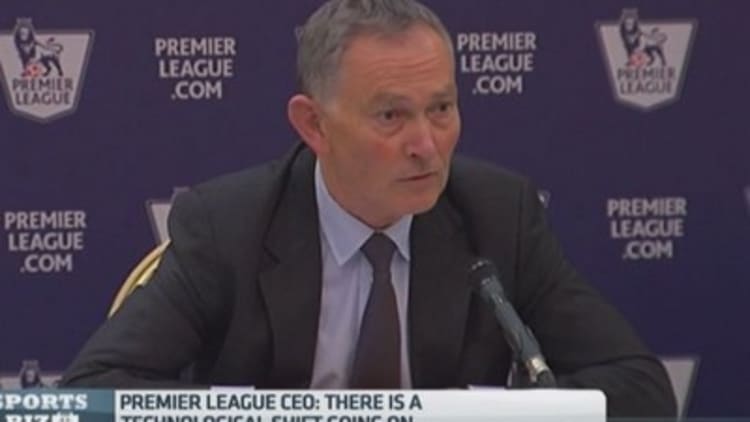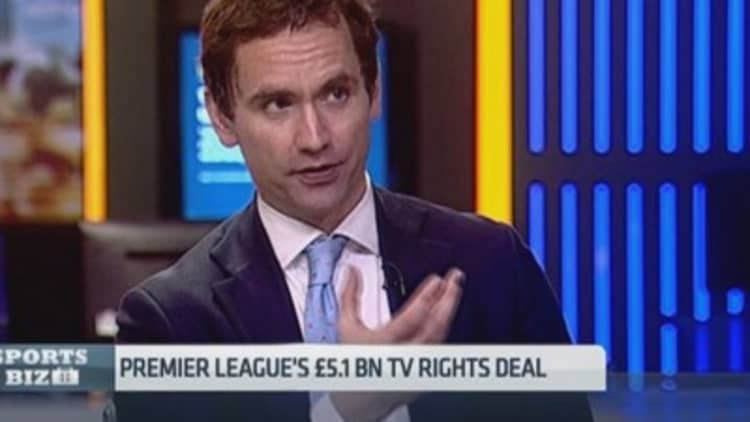
Splashing out a record amount for the TV rights to soccer's English Premier League produced mixed fortunes for the broadcasters involved Wednesday, as Sky shares dropped 4 percent while rival BT saw a 3 percent pop.
Investors reacted negatively to the news that Sky paid £4.2 billion for the rights to show 126 matches – over 80 percent more than the cost of its existing contract.
BT, meanwhile, paid 18 percent more than its previous contract and upped the number of games per season from 38 to 42. The deal is for the three seasons between 2016 and 2019.
The cost of securing the games outstripped forecasts, and analysts questioned whether Sky – a British telecoms company known for its sports coverage – could afford it.
"What they paid was significantly ahead of expectations. It remains to be seen whether they can monetize those rights effectively," Ian Whittaker, media analyst at Liberum Capital, told CNBC'S Squawk Box Europe.
Sky said in statement that it would minimize the impact on consumers and would fund the rights acquisitions via savings made through "efficiency plans".
Whittaker stressed that if Sky passed on the full costs to customers, most Sky Sports subscribers would pay more than £10 extra on their monthly bill. Currently, Sky TV customers subscribing to its "Sports Bundle" pay around £46 per month.
The massive costs paid for the rights to the soccer games highlights the escalating battle between Sky and BT for sports dominance. BT sport is offered free to the company's broadband customers, which costs from £30.48 per month.
Who won?
Despite the price, analysts said that Sky looked to have won the latest fight with BT.
"The amount that the prices were bid up suggest that BT was making a very strong challenge to increase the number of packages that it was going to own," Tim Westcott, head analyst of TV programming at IHS, told CNBC by phone.
Read MoreBT Sport tackles Sky over soccer rights
"Leaving alone the price it paid, Sky has clearly managed to defend its leadership in terms of rights."
Sky retained the rights to 26 first-pick matches – the best games of the seasons – while BT has just 12. This means that Sky paid around £11 million per game, while BT paid £7.6 million to show its games.
One big drawback for Sky, however, is that it will lose the rights to Champions League soccer from this year, after a major coup by BT in 2013 saw it secure the rights to all of the games.

The Europe-wide Champions League is considered the top tournament on the region's soccer scene and features the best clubs from across the continent.
"This was big in terms of the audience…and there is no obvious substitute event for Sky Sports to program where the Champions League was. They are going to lose that audience and that will be a big blow," Westcott said.
The Premier League's boss distanced himself from the BT-Sky tussle and said the bidding process was fair.
Read MoreHere are the world's top-earning soccer teams
"We've run a competitive process, it's an open process…people have to bid what they think they need to bid that that they want to win," Richard Scudamore told CNBC in a TV interview.
Soccer clubs win
Ultimately, soccer clubs will be the big winners, analysts said. In 2013/14, the first season of the current three-year broadcast rights cycle, the 20 top-flight British clubs shared broadcast distributions totalling £1.5 billion, according to Deloitte.
New York-listed soccer team Manchester United saw its shares close up 4.7 percent on Tuesday after the rights deal was announced. Broadcasting income accounts for around a third of Man United's total revenue, and the club, along with others in the Premier League, is expected to see a big boost from the 2016/17 season.
"The benefits of the new deals for Premier League clubs will be substantial," Austin Houlihan, senior manager in the Sports Business Group at Deloitte, said in a note.


